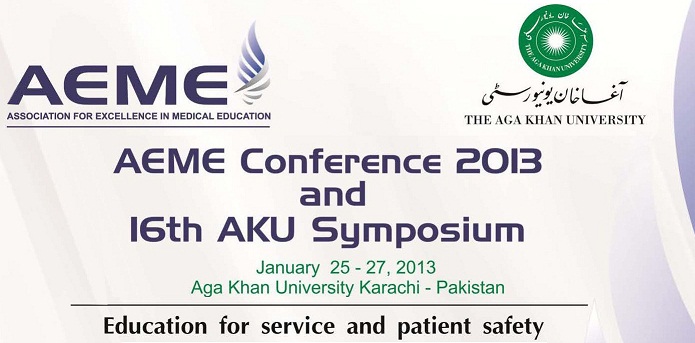Day 1 : Oral Presentations (Theme: Curriculum - Teaching & Learning)
Students’ perceptions and their responses to written feedback in the nursing degree programs in Karachi
Location
AKU Auditorium
Start Date
26-1-2013 4:10 PM
Abstract
Background: Feedback is an important aspect of assessment to further learning. Moreover, written feedback known to assess and develop students’ academic writing skills. However many factors may affect the practices of written feedback and its utilization. The study aimed at identifying students perceptions about written feedback in the nursing degree programs in Karachi.
Methods: A descriptive exploratory design was employed in the study. Using a universal sample technique, 379 students from nine public and government nursing institutions participated. The data was collected through a modified Assessment Experience Questionnaire (AEQ) develop by Gibbs and Simpson (2003). The quantitative data was analyzed for descriptive statistics, while qualitative data were typed and then manually analyzed for various categories. The study was conducted after an approval from University Ethical Review Committee.
Results: Variations were found in the practices of written assignments, provision of assessments criteria and provision of written feedback. Eighty percent of the students reported receiving written feedback with or without oral feedback. Whereas 20 % of them, did not receive written feedback but verbal feedback on their assignments. Only 40% reported receiving feedback on regular basis. Assignment guidelines were not always provided in a written form. In most cases the guidelines were ambiguous as well as the feedback was not always reflective of the guidelines. Student elucidated several concerns such as delayed feedback, unfair feedback, and lack of opportunities to clarify feedback. They also provided several suggestions to improve practices on written feedback.
Conclusions: Teachers need to be aware of role and impact of written feedback on students’ learning and develop competence in giving effective feedback. For better utilization of the feedback teachers and students should have shared understanding about the goal, and language of the feedback. There should be institutional commitment to introduce polices to promote practices of effective written feedback.
Key words: Written Feedback, Academic writing skills, Assessment, Student perceptions
Students’ perceptions and their responses to written feedback in the nursing degree programs in Karachi
AKU Auditorium
Background: Feedback is an important aspect of assessment to further learning. Moreover, written feedback known to assess and develop students’ academic writing skills. However many factors may affect the practices of written feedback and its utilization. The study aimed at identifying students perceptions about written feedback in the nursing degree programs in Karachi.
Methods: A descriptive exploratory design was employed in the study. Using a universal sample technique, 379 students from nine public and government nursing institutions participated. The data was collected through a modified Assessment Experience Questionnaire (AEQ) develop by Gibbs and Simpson (2003). The quantitative data was analyzed for descriptive statistics, while qualitative data were typed and then manually analyzed for various categories. The study was conducted after an approval from University Ethical Review Committee.
Results: Variations were found in the practices of written assignments, provision of assessments criteria and provision of written feedback. Eighty percent of the students reported receiving written feedback with or without oral feedback. Whereas 20 % of them, did not receive written feedback but verbal feedback on their assignments. Only 40% reported receiving feedback on regular basis. Assignment guidelines were not always provided in a written form. In most cases the guidelines were ambiguous as well as the feedback was not always reflective of the guidelines. Student elucidated several concerns such as delayed feedback, unfair feedback, and lack of opportunities to clarify feedback. They also provided several suggestions to improve practices on written feedback.
Conclusions: Teachers need to be aware of role and impact of written feedback on students’ learning and develop competence in giving effective feedback. For better utilization of the feedback teachers and students should have shared understanding about the goal, and language of the feedback. There should be institutional commitment to introduce polices to promote practices of effective written feedback.
Key words: Written Feedback, Academic writing skills, Assessment, Student perceptions

